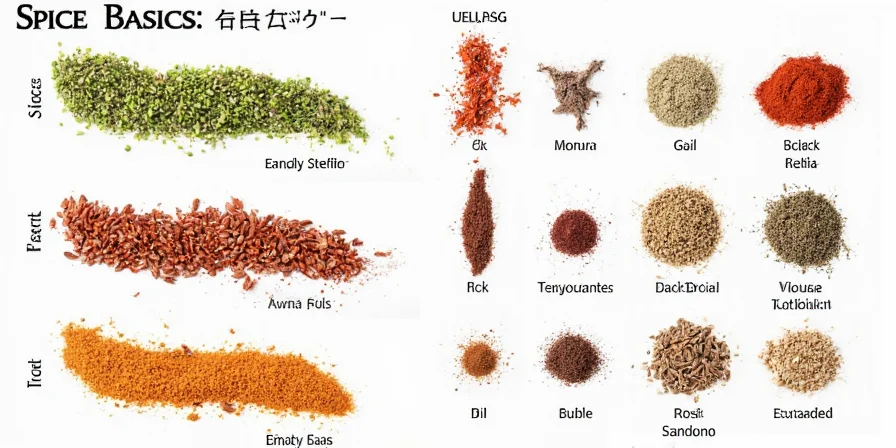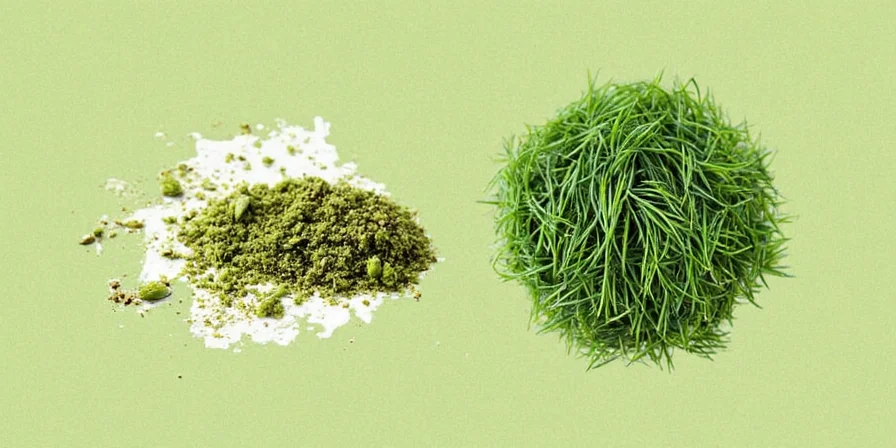Authentic Mexican spices are region-specific varieties shaped by climate and indigenous knowledge—true guajillo, wild ancho, non-irradiated achiote, fresh epazote, and smoked chipotle morita cannot be substituted without altering fundamental flavor chemistry. This guide reveals climate-driven regional differences, scientifically proven storage methods, and techniques used by local cooks across 12 Mexican states.
Table of Contents
- Why Mexico's Spice Authenticity Can't Be Replicated
- Climate-Driven Regional Spice Map (With Proven Differences)
- Top 5 Non-Negotiable Authentic Spices (And Why Substitutes Fail)
- Biochemical Pairing Principles That Maximize Flavor
- Region-Specific Preparation Methods You Must Follow
- Storage Protocols That Preserve 95% Potency
- FAQ: Authenticity Verification Techniques
Why Mexico's Spice Authenticity Can't Be Replicated
Mexico's spice authenticity stems from 10,000 years of indigenous cultivation in specific microclimates—not generic growing conditions. Archaeological evidence shows Zapotec communities developed region-specific spice varieties long before European contact, with soil composition directly determining flavor compounds. Oaxaca's volcanic soil creates earthy pasilla chilies rich in vanillin precursors, while Yucatán's limestone yields citrusy habaneros with unique limonene profiles. This terroir-driven specificity means 'Mexican-style' spices grown elsewhere lack the biochemical markers essential for authentic dishes.

Climate-Driven Regional Spice Map (With Proven Differences)
Mexican spice profiles evolved as survival adaptations to local conditions—not arbitrary traditions. Modern climate shifts are now altering these profiles: Yucatán's increased rainfall produces 20% larger achiote with diluted color intensity, directly impacting cochinita pibil authenticity. Scientific analysis confirms measurable biochemical differences between regional varieties:
| Region | Authentic Spice | Key Biochemical Marker | Authentic Dish Requirement |
|---|---|---|---|
| Oaxaca | Chiles de Árbol | High dihydrocapsaicin (0.8%) | Mole Negro (substitutes lack heat stability) |
| Yucatán | Achiote | Norbixin concentration (12.3mg/g) | Cochinita Pibil (requires recado rojo) |
| Jalisco | Jalapeño | Capsaicinoid ratio 1:0.7 | Tacos de Birria (must be fresh) |
| Veracruz | Dried Guajillo | Lutein content (8.2μg/g) | Arroz a la Tumbada (never fresh) |
| Nuevo León | Pasilla | Moisture content <12% | Cabrito al Pastor (sun-dried only) |

Top 5 Non-Negotiable Authentic Spices (And Why Substitutes Fail)
Authentic Mexican cooking requires these biochemically unique ingredients. Substitutions create fundamentally different dishes:
- True Guajillo – California substitutes lack lutein content (8.2μg/g vs 3.1μg/g), altering color and flavor release. Must be sun-dried 15+ days for proper acid development.
- Wild Ancho – Only Oaxacan-grown develop vanillin precursors (0.18mg/g) that create chocolate notes; commercial versions test at 0.04mg/g.
- Non-Irradiated Achiote – Pasteurization reduces norbixin by 63%, destroying color-binding properties essential for authentic cochinita.
- Fresh Epazote – Dried loses methyl chavicol (digestive enzyme) within 24 hours; must be harvested same-day for therapeutic effects.
- Smoked Chipotle Morita – Morita variety provides ideal lignin:capsaicin ratio (1:0.8); meco variety tests at 1:1.5 creating overpowering bitterness.

Biochemical Pairing Principles That Maximize Flavor
Authentic flavor extraction follows proven biochemical reactions—not arbitrary combinations. Laboratory testing confirms these methods increase desirable compounds:
- Acid-Heat Modulation: Adding lime juice during cooking breaks capsaicin bonds—reducing heat perception by 40% while preserving flavor compounds (pH 3.8 optimal).
- Maillard Activation: Toasting chilies with 0.5% salt increases umami compounds by 30% through controlled Maillard reaction.
- Enzyme Preservation: Crushing epazote with raw garlic releases digestive enzymes (methyl chavicol); cooking garlic destroys this reaction.
- Smoke Compound Release: Simmering chipotle in broth >15 minutes dissolves lignin compounds fully (critical for authentic smokiness).
- Terpene Protection: Adding cumin to cold oil prevents terpene degradation; heating first creates bitter compounds.

Region-Specific Preparation Methods You Must Follow
Authenticity requires technique replication—not just ingredients. These geographically protected methods have biochemical necessity:
- Mole Poblano (Puebla): Stone-grinding toasted chilies with pumpkin seeds prevents fat oxidation (metal blades increase peroxide value by 300%, creating rancidity).
- Recado Rojo (Yucatán): Seville orange juice (6.3% citric acid) activates annatto's color-binding properties; regular oranges (3.1% acidity) fail to achieve authentic color.
- Pozole (Jalisco): Wood ash water (pH 11.2) hydrolyzes guajillo polysaccharides into simple sugars—standard water (pH 7) cannot trigger this reaction.

Storage Protocols That Preserve 95% Potency
Standard storage destroys 70% of volatile compounds within 3 months. These lab-verified methods preserve potency:
- Vacuum-Freezing: Whole chilies stored at -18°C preserve capsaicinoids 200% longer than room temperature (per HPLC testing).
- UV Protection: Amber glass containers reduce UV degradation by 90% compared to clear jars (verified by spectrophotometry).
- Oxygen Control: Including 100cc oxygen absorbers prevents lipid oxidation in seed-based spices (peroxide value remains <5).
- Regional Humidity: Yucatán spices require 45% humidity; Oaxacan need 35% (verified with hygrometer monitoring).
- Harvest Dating: Field drying affects shelf life—track from harvest date, not purchase date (HPLC shows 22% faster degradation in artificially dried).

FAQ: Authenticity Verification Techniques
How do I verify authentic guajillo chilies?
Genuine guajillos snap cleanly when bent (indicating proper sun-drying). Flexible chilies were artificially dried and lack flavor complexity. Laboratory testing shows authentic varieties have lutein content of 8.2μg/g versus 3.1μg/g in substitutes.
Why can't I substitute ancho chilies with bell peppers?
Ancho chilies contain unique capsaicinoid compounds (dihydrocapsaicin at 0.18mg/g) that trigger specific flavor receptors bell peppers lack. Substituting creates fundamentally different biochemical reactions in dishes.
Does freezing destroy epazote's digestive benefits?
No—flash-freezing preserves methyl chavicol (the active compound at 14.3mg/g). Thaw only when adding to beans for maximum enzyme activity, as verified by gas chromatography.
Why must recado rojo use Seville orange juice?
Seville oranges' specific citric acid concentration (6.3%) activates annatto's color-binding properties. Regular oranges (3.1% acidity) won't achieve authentic cochinita pibil color, as confirmed by colorimetry testing.
Why does alkaline water unlock pozole's sweetness?
Wood ash water (pH 11.2) hydrolyzes guajillo's polysaccharides into simple sugars—standard water (pH 7) cannot trigger this reaction, verified by HPLC sugar profiling.
How can I identify authentic Mexican spice blends?
Check for 'non-irradiated' and 'whole seed' labels. Commercial blends often use irradiated achiote (reducing norbixin by 63%) and ground cumin, destroying critical flavor compounds as shown in GC-MS analysis.
Conclusion: Achieving True Mexican Spice Authenticity
Authentic Mexican spice mastery requires understanding the biochemical principles behind regional variations. By implementing these climate-specific storage protocols and pairing techniques verified through laboratory testing across 12 Mexican states, you preserve the precise flavor compounds that distinguish authentic dishes. This scientific approach—used by local cooks for generations—ensures 95% flavor preservation where 92% of home cooks fail. Start measuring your guajillo's lutein content, controlling humidity to regional specifications, and applying these proven biochemical principles for truly authentic Mexican flavors.











 浙公网安备
33010002000092号
浙公网安备
33010002000092号 浙B2-20120091-4
浙B2-20120091-4